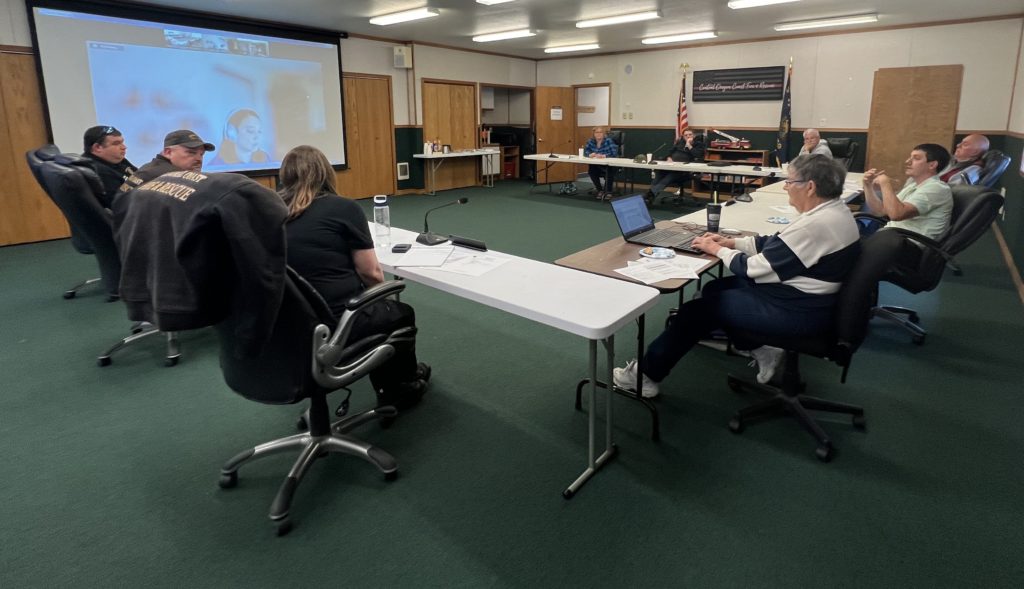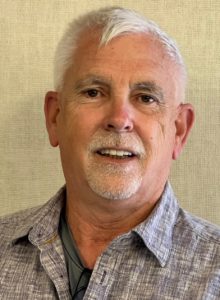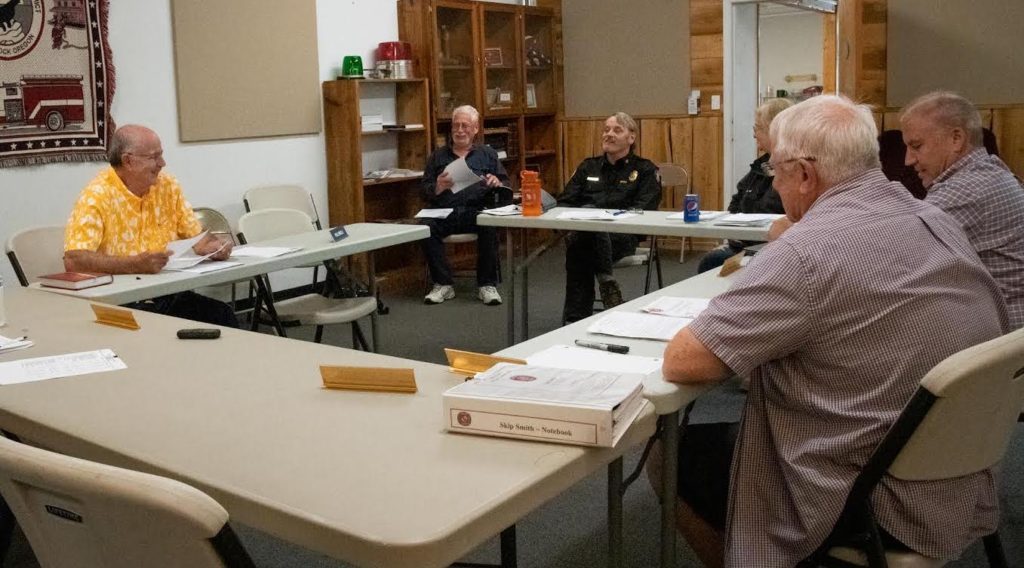
By QUINTON SMITH and JORDAN ESSOE/YachatsNews.com
WALDPORT – A 2½-year-old agreement between the Central Oregon Coast and Seal Rock fire departments to share personnel and equipment is all but dead – if the two agencies can even agree whether it still exists.
So the question is – what, if anything — happens next?
The newly-reconstituted board of the Central Coast Fire & Rescue district voted unanimously Aug. 18 to ask the Seal Rock board if it wants to keep the agreement, or establish two committees and their chiefs to work on a new one – or ditch it entirely.
The Seal Rock board thinks it has already cancelled the agreement. Chief Will Ewing said the district mailed a certified and signed copy of cancellation to either then-COCF&R board chair Buster Pankey or the Central Coast office. But Pankey stopped communicating with fire staff during the May-June recall campaign before resigning from the board June 13 after voters recalled two other board members.
COCF&R Chief Jamie Mason said his district has received no such letter.
Ewing told YachatsNews he can’t find a signed copy of the letter or the certified mail receipt.
While there still needs to be an officially signed cancellation notice, the two districts have essentially gone their separate ways since January. It is a complicated and messy process involving two districts that now have widely different philosophies and direction.
A new Seal Rock board fired its former chief last October and hired Ewing to take over the department. Its four paid firefighters left for other jobs and until this month the district relied on fill-in firefighters, when they were available, and volunteers. This month, Seal Rock hired Joe Munger of Lafayette, its only full-time paid firefighter since Derek Udoutch left in June.
The Seal Rock board didn’t like the intergovernmental agreement because they felt it favored Central Oregon Coast due to that district’s higher volume of calls. It also wanted its firefighters to be more visible in the Seal Rock area, rather than stationed or training in Waldport.
In January, Ewing notified Mason that its firefighters would stay at Seal Rock stations, no longer train with Central Coast, and would respond with one firefighter or volunteer and only on what it deemed priority calls.
Without access to regular Seal Rock staff, the Central Coast board agreed this spring to add two firefighters to its existing four-member staff to ensure the district always had two people on duty to respond to calls.
The two departments no longer train together or share equipment.
But the Central Coast District board also had its well-known issues. After eight months of turmoil, voters recalled two newly-elected board members in June, leading also to Pankey’s resignation.
Pankey and one of the recalled board members had met twice in the spring with two Seal Rock board members to discuss the intergovernmental agreement, but then put those talks on hold to wait for the outcome of the recall.
Seal Rock now responds to COCF&R’s mutual aid requests – often with volunteers only — when it asks neighboring departments for help. Central Coast is dispatched to calls in the Seal Rock district – often 5 or 10 minutes after initial 9-1-1 calls — when that department has no one on duty.
Try to talk, or cancel?
During a workshop Aug. 11 and regular meeting Aug. 18, Central Coast board members said it was time reach out to Seal Rock to see if it wants to work out a new agreement or formally cancel it.
“My opinion is the IGA is not in existence,” Mason told the board Aug. 11. “No one is using it now. There’s no joint training or sharing of equipment.”
Board members Kevin Battles and Jon MacCulloch said at both meetings it wasn’t fair to Central Coast taxpayers to subsidize Seal Rock operations by continually being the first responders to calls there.

“There has to be some sort of financial accountability so that we’re not serving two districts but only getting money from one,” said MacCulloch, who was appointed to the board in July after the recall. “The taxpayers of this district are picking up the tab for us responding to their calls.”
After exchanging heated-to-terse emails last winter, Mason and Ewing have essentially ceased communication. In contrast, Mason said, Central Coast’s staff shares training with the Yachats Rural Fire Protection District and communicates regularly.
“We know what they’re doing, we know their equipment and we know who’s on staff,” he said.
After an extended discussion Aug. 18, the COCF&R board voted unanimously to send a letter to Seal Rock to see if it was interested in re-working the intergovernmental agreement or if it wanted to talk about other response options.
The COCF&R committee would consist of MacCulloch and newly-appointed board member Ray Woodruff, along with Mason. If there is no interest or progress, then the board said the agreement could just expire Dec. 31, when it believes the contract lapses.

Different view in Seal Rock
In Seal Rock, details surrounding the state of the intergovernmental agreement are perceived quite differently.
The Seal Rock board generally assumes the agreement with Central Oregon Coast has already lapsed or is about to lapse.
Seal Rock believed the agreement was to automatically terminate in May. But in April – after negotiations with COCF&R broke down during the recall campaign – the Seal Rock board unilaterally voted to extend its commitment to the broad aspects of the agreement through Aug. 31.
During its monthly meeting Aug. 18, Seal Rock board member Skip Smith suggested they consult a lawyer to confirm the agreement has been legally terminated.
“I have a concern that we’ve done everything legal to make sure we are out of the IGA,” said Smith. “I just want to make sure that we have met all of our obligations.”
After a short discussion about whether it was a necessary use of district funds, the board unanimously agreed to consult a lawyer.
“I think we’re done – and if we’re not done it doesn’t make any difference,” said Ewing.
Ewing’s point of view is that there doesn’t appear to be anything binding within the agreement, and that it does not create enforceable obligations to staff other district’s engines or stations.
Board member Paul Rimola indicated that, if approached, he and board chair Karl Kowalski might be willing to return to committee meetings with COCF&R, but explained a persistent ambiguity surrounding the content of the document.
“It’s been amended and re-amended, and thrown out, and brought back in,” said Rimola. “I have no idea, really to this day, what is this IGA? – I have no idea.”
What Ewing says they do have in place with COCF&R is an “automatic aid” agreement. Ewing said he wants to work with Mason to get that agreement clearly defined to make sure that any fire, motor vehicle crash, or Priority 1 medical call in either district is automatically answered by both departments.
Ewing said he reached out to Mason a couple weeks ago about the automatic aid agreement and is optimistic about that dialogue continuing soon.
“Our ISO (insurance) rating is based on an automatic aid document, not the IGA,” said Ewing.
Ewing expressed surprise that Central Coast is talking about further negotiating the intergovernmental agreement. But that no matter what happens, “We’re not going to stop 9-1-1,” Ewing said. “We’re still going, they’re still coming.”
Regarding any animosity that has accompanied previous deliberations, Ewing said, “I think the judgmental stuff is going away.”
- Quinton Smith is the founder and editor of YachatsNews.com and can be reached at YachatsNews@gmail.com; Jordan Essoe is a Waldport-based freelance writer who can be reached at alseajournal@gmail.com


